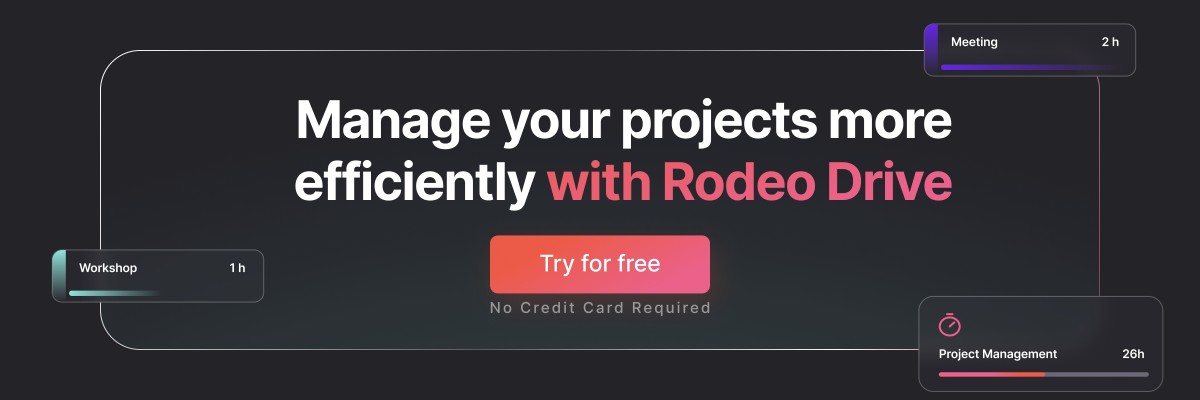16 Best HoneyBook Alternatives & Competitors for Projects
While some project management software platforms strive to offer a handful of high-quality features, others prefer to focus on the number of features instead.
HoneyBook falls into the latter category, as the tool’s many features make it easy to feel overwhelmed. Don’t worry though – users looking to escape the feature factory will be pleased to learn that there are over a dozen HoneyBook alternatives on the market that are worth investigating.
By the end of this blog, you should have a better understanding of your options.
Why look for HoneyBook alternatives?
HoneyBook is a good project management software solution, for small businesses, especially freelancers — due to its flexibility. If you’re already a user, chances are that you either outgrew the platform or the tool isn’t meeting all of your expectations.
Just a quick search and you will find a number of negative reviews addressing the platform’s shortcomings – including its frustrating customer service.
Here are the top 3 cons of using HoneyBook – supported by real user reviews – that might make you consider an alternative.
#1 Steep learning curve
The double-edged sword of using a platform with dozens of features is the steep learning curve these features can create. With HoneyBook’s onboarding assistance consisting of prerecorded training videos, you’ll be left to figure out how the platform fits into your existing workflows all on your own. This is not the sort of platform that allows you to hit the ground running as soon as you sign up.

Source: Capterra

Source: Capterra
#2 Overwhelming number of features
Even if you understand how to use HoneyBook’s many features, the sheer number of them is overwhelming for many new users. This might be especially true for users whose workflows are more straightforward, as the platform’s functionalities might be well beyond your needs.

Source: G2
#3 Poor customer support
Online reviewers most commonly criticize HoneyBook for its poor customer service. Early users say that HoneyBook used to have live support with real people, but the platform has switched to email-based support in recent years, which many people find unsatisfactory. Resolving problems with the platform over email typically extends the length of time it takes to resolve the issue, as seen in the below reviews.

Source: Capterra

Source: Capterra

Source: Capterra
The 16 best HoneyBook alternatives
If you’ve decided that HoneyBook is too complex for your team’s needs or that you’re not ready to waste valuable time on an extensive onboarding process or dealing with inefficient customer support, then you’re in the right place.
Here’s a complete list of the 16 best HoneyBook alternatives for you to consider instead. We’ve also included a list of features, pricing plans, and photos of each to help you compare your options easily.
1. Rodeo Drive
Rodeo Drive is a robust project management solution with budgeting, time tracking, and financial management features to support your projects at every stage of the project lifecycle.
The platform is an excellent choice for small- to mid-size businesses, as it’s a scalable solution that doesn’t charge per number of projects or clients. Similar to HoneyBook, you can easily send project estimates and invoices directly to your clients from the platform. And the integration with QuickBooks allows you to stay on top of your bookkeeping.
Take a look at some of the other features that help make us the best HoneyBook alternative on the market:
Intuitive and easy-to-use user interface
Learning curves waste valuable time, and we’ve designed Rodeo Drive to be intuitive and easy to use in order to prevent onboarding challenges. When you log onto the platform, you’ll land on your Projects page, which features all of your draft, active, and closed projects at a glance. From there, you can click on any of your projects for a complete look at all of the details.
It can’t get any easier. In fact, not a single Rodeo Drive feature requires any technical expertise or lengthy video tutorials to understand how they work.
Rodeo customer Dorst & Lesser has found that Rodeo has made the process of onboarding new employees significantly easier: “The interface looks very neat and refined, and new hires quickly get used to it. Whenever I show a new intern or employee how it works, we only need to go through everything once and that’s it,” says Sophie van der Togt, Head of Account.

Building a budget in Rodeo Drive
Financial management features for every stage of your project lifecycle
Whereas HoneyBook has an overwhelming number of features, Rodeo Drive focuses on providing high-quality features to help you at each stage of your project. The financial management capabilities that Rodeo Drive offers help structure your project along the way.
For example, projects begin with a budget in Rodeo Drive, meaning project managers can calculate the cost of each project phase, plan time activities, and allocate resources before the project officially kicks off.
Once the budget is built, you can send an estimate to the client for approval and send them an invoice once it’s time to bill your client for the work your team has completed.
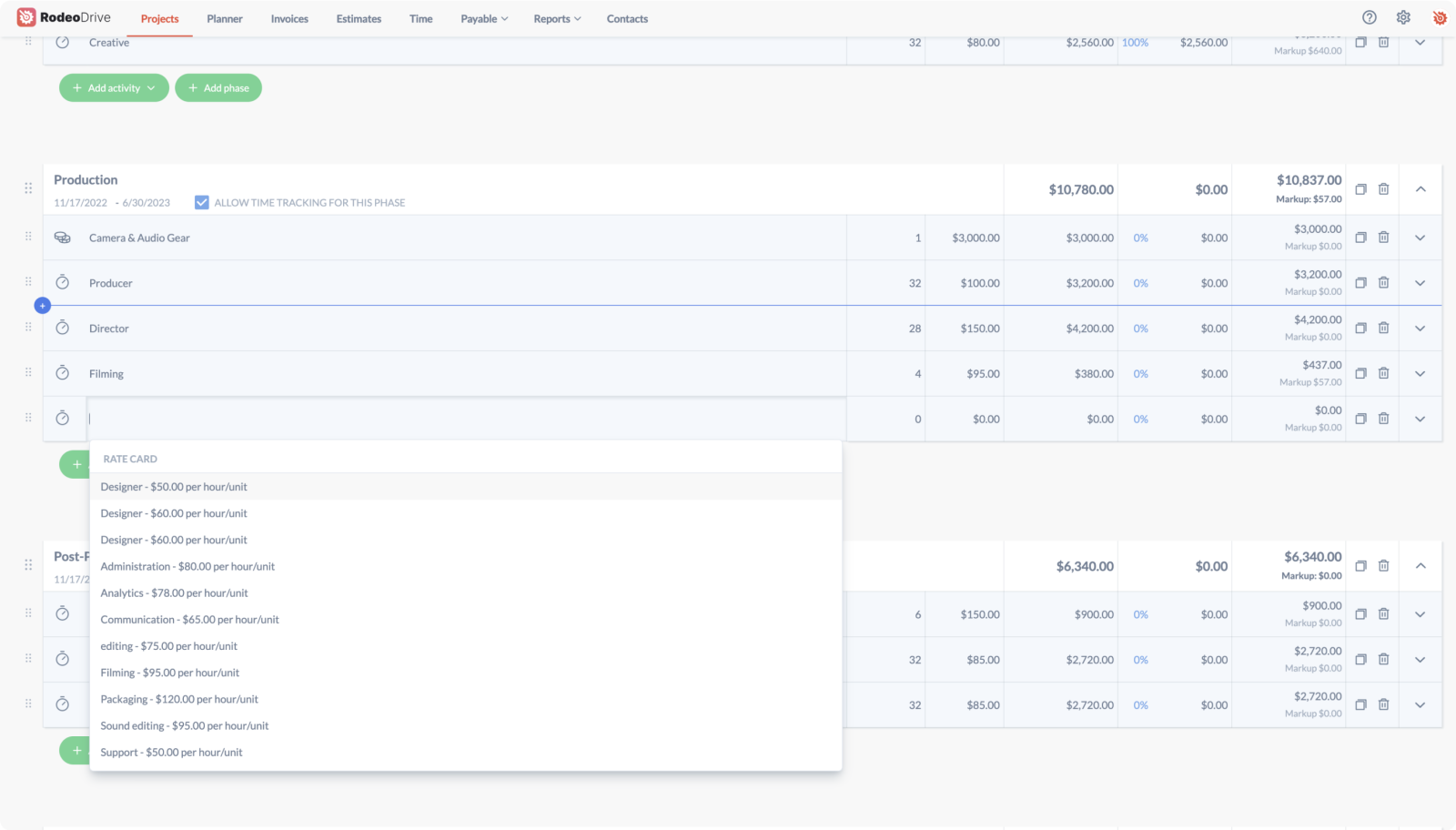
Adding a time activity to a budget in Rodeo Drive
Advanced automated onboarding assistance and live chat support
Top-tier customer support is Rodeo’s priority, and that’s why we offer automated onboarding so you can jump right into the platform on day one without the need for any outside help. Many other HoneyBook alternatives charge for onboarding support, but ours is always free.
And while HoneyBook uses lengthy email threads to resolve customer issues with the platform, we’re always available via live chat support for users on the Achiever plan.
Additional features:
- Team capacity planning to ensure deadlines are met
- Create customizable client-ready estimates
- Invoicing that makes it easier than ever to bill clients
- Track time effortlessly right from your "Time" tab
- Integration with QuickBooks (US) and Xero (UK)
Pricing:
There are two pricing plans available in Rodeo Drive — the Free plan, which includes a limited feature set, and the Achiever plan, which gives you access to all features for $14.99 per user/month.
Companies on the Free plan will have a limited number of seats, 3 active projects, no guest users, and no reports. You’ll need to upgrade should you need more than that.
Get started for free today or schedule a demo to learn more.
2. Bonsai
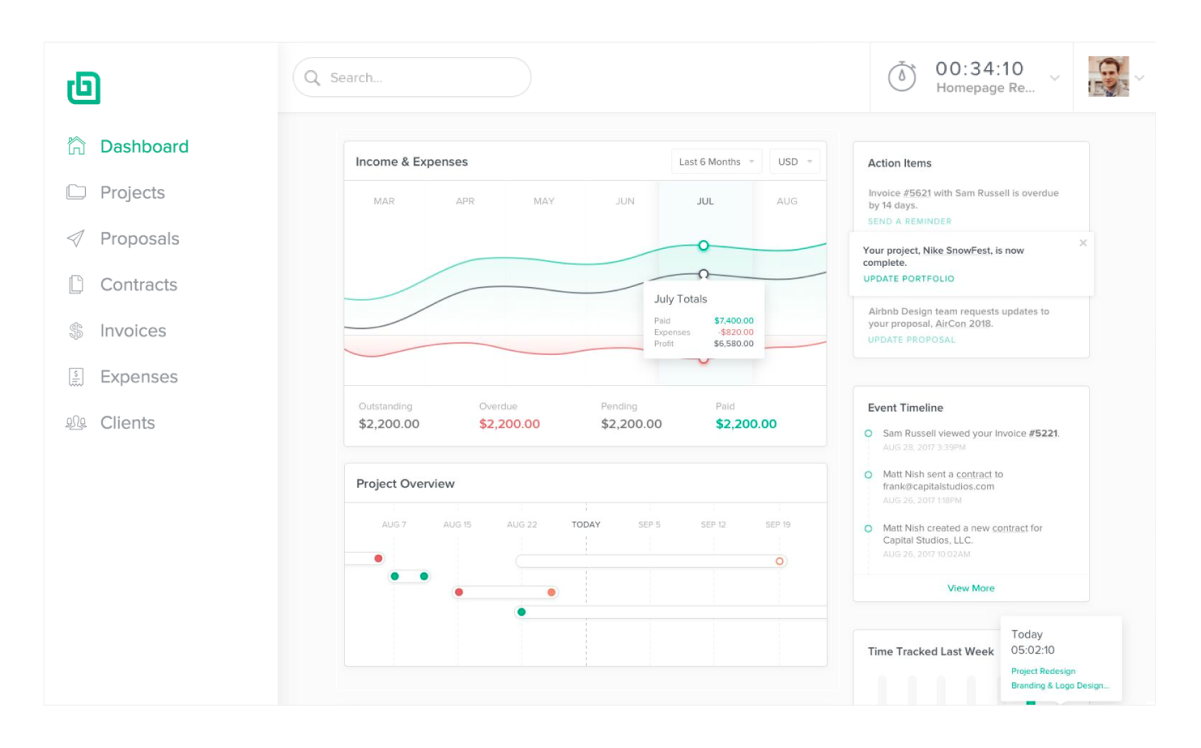
Source: Bonsai
Bonsai is an all-in-one business management solution made for freelancers and small teams. HoneyBook and Bonsai have a lot of similar feature offerings, including online payment processing, contracts, and invoicing.
Both platforms have similar shortcomings in that they offer a lot of features, but those features aren’t always as robust as they could be. For example, Bonsai does offer time tracking, but there’s no way to export a report of your recorded hours, meaning you’ll need to send screenshots to your clients if you need to provide documentation of your recorded hours.
Related: Best Bonsai Alternatives to Try Now
Bonsai’s popular features:
- Client CRM
- Proposals
- Invoices
- Time and task tracking
Bonsai’s pricing:
- Starter plan: $25 per month
- Professional plan: $39 per month
- Business plan: $79 per month
- Team seats can be added for an additional $10 per user/month.
3. Hive
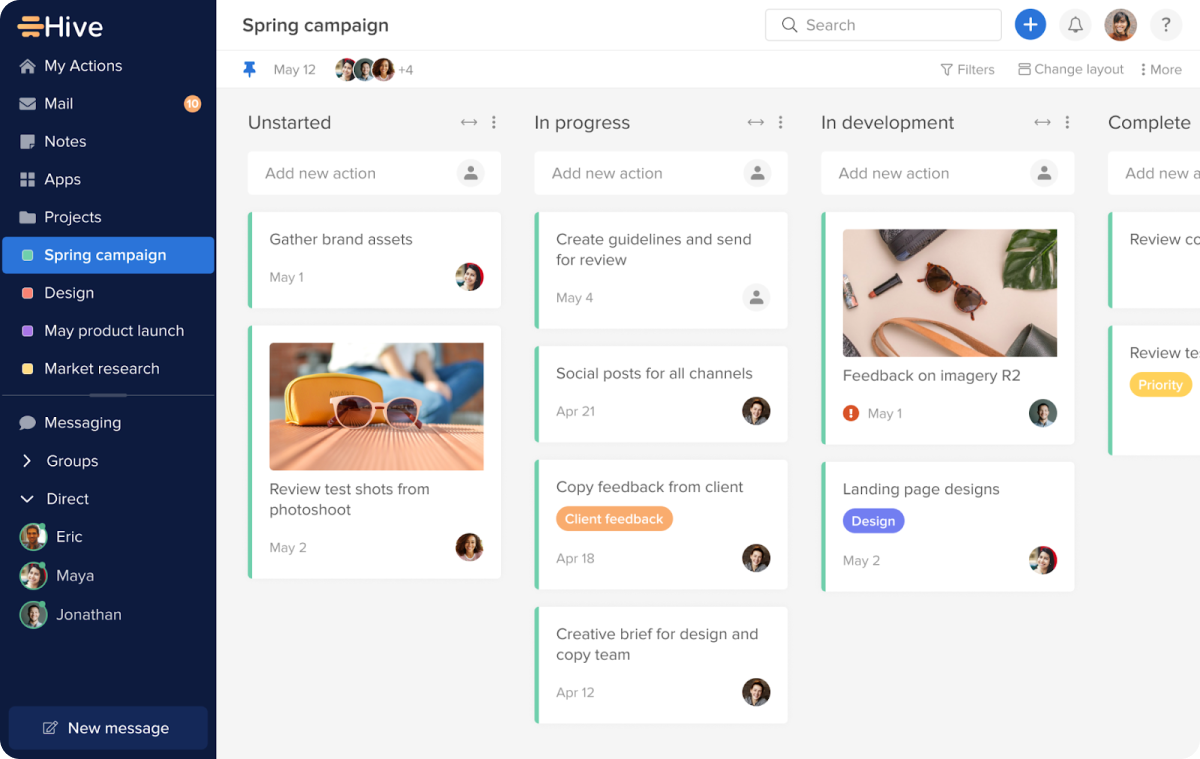
Source: Hive
Hive’s customization and collaboration tools make it a good fit for those managing more complex projects. Hive also offers live customer support – a key difference from HoneyBook.
Hive’s focus is on holistic project management, so if you’re looking for a HoneyBook alternative that offers some of the client management tools that HoneyBook has, you might find yourself dissatisfied with Hive.
Also read: Top Hive Alternatives To Try Out
Hive’s popular features:
- Time tracking
- Workflow automation
- Reporting
- Integrations
- In-app messenger
Hive’s pricing:
- Hive Solo plan: Free
- Hive Teams plan: $18 per user/month
- Enterprise plan: Available upon request
4. Dubsado
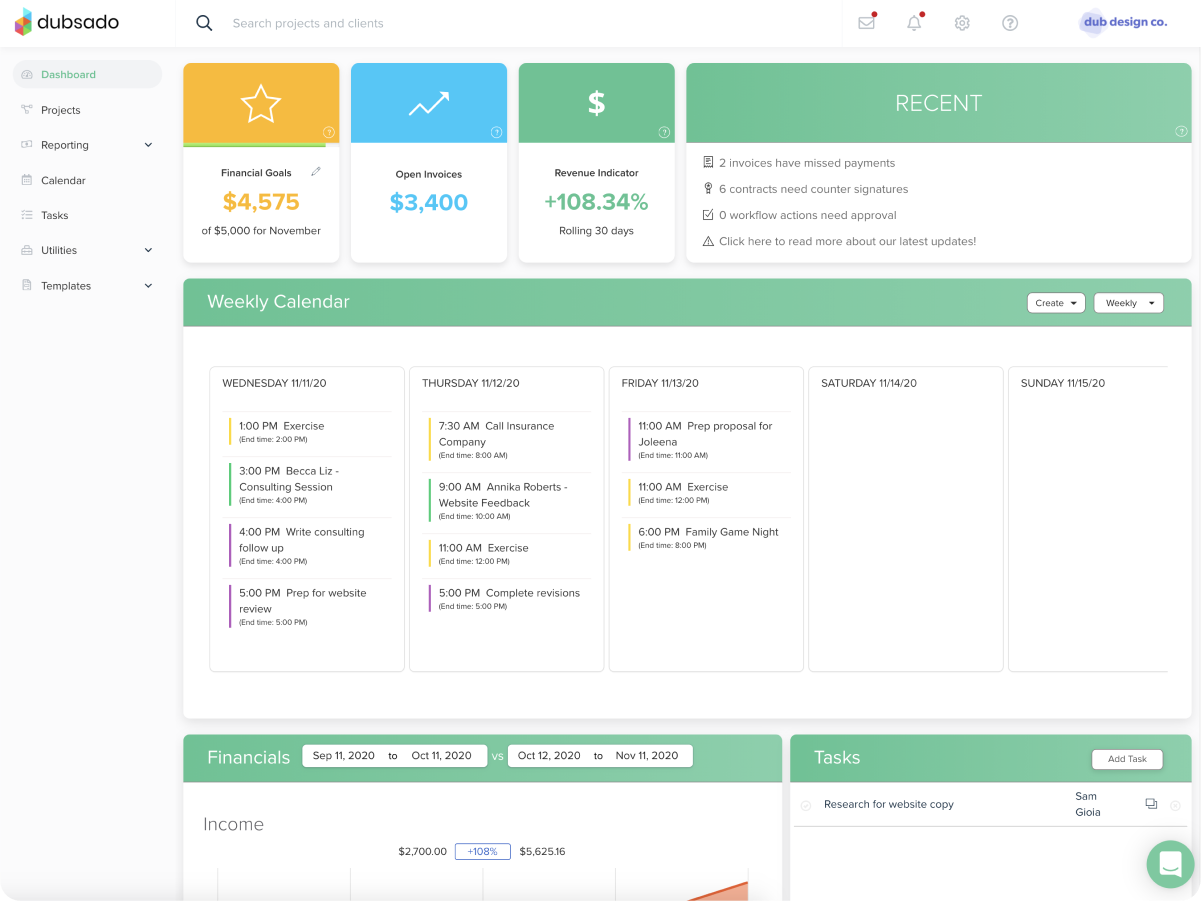
Source: Dubsado
Dubsado’s features are centered around the needs of small businesses and freelancers, meaning the tool can be used by everyone from virtual assistants to event planners, accountants, and even makeup artists.
The platform’s main capabilities include automations, scheduling, client portals, and invoicing. While these features are helpful, task management functionalities are noticeably missing. This makes Dubsado a fit for someone who needs a software tool that can help structure their day and keep client matters organized without needing task management or planning functions.
Dubsado’s popular features:
- Client portals
- Invoicing and reporting
- Forms and templates
- Automated administrative tasks
Dubsado’s pricing:
- Starter plan: $20 per month
- Premier plan: $40 per month
5. 17hats
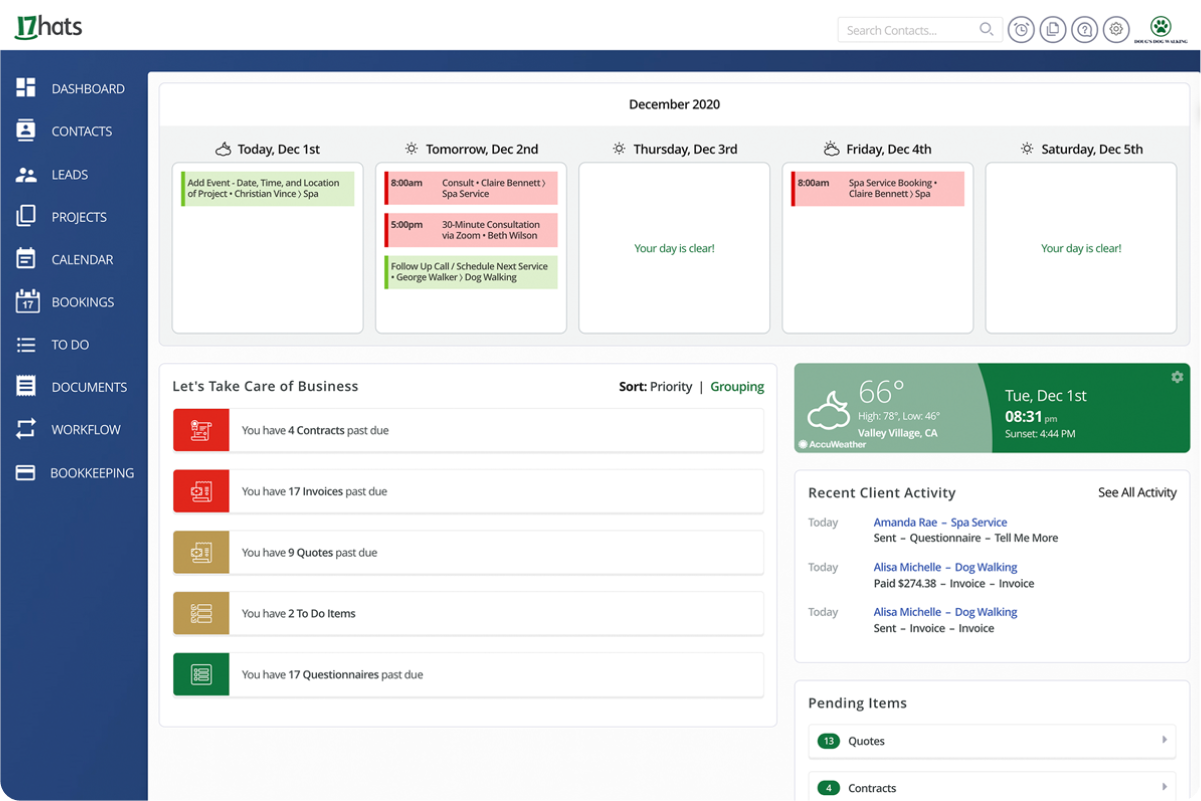
Source: 17hats
As the name suggests, 17hats is built for freelancers who typically wear several hats during their day to day. With offerings ranging from email templates to time management to lead management, the platform offers a unique array of features. 17hats also has unique branding customization options to ensure each point of contact with clients is professional and on brand.
The tool’s price point might be higher than you’d expect, and this is a common complaint among reviewers online. Some also added that a bit of trial and error is necessary before getting the hang of the app due to its less-than-intuitive design and variety of features.
17hats’ popular features:
- Time management
- Reporting
- Advanced workflows
- Lead management
- Client portal
17hats’ pricing:
- Essentials package: $15 per month
- Standard package: $30 per month
- Premier package: $60 per month
6. FreshBooks
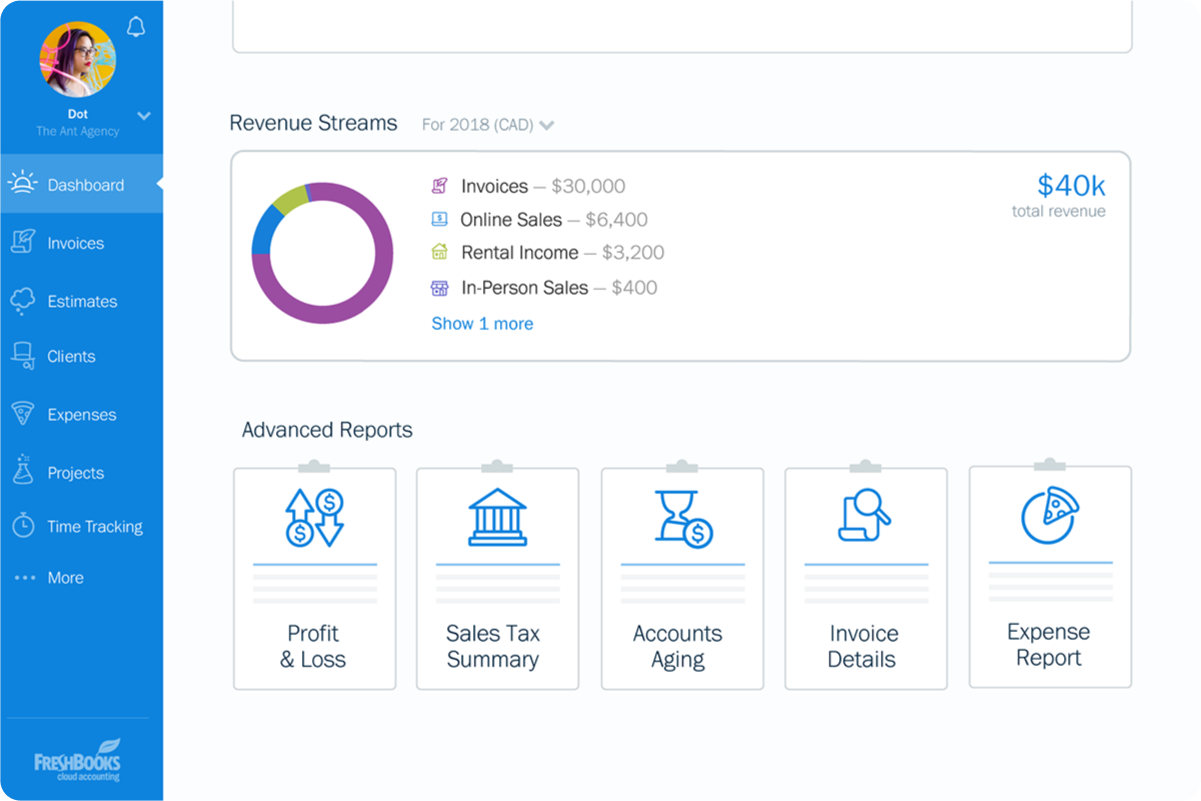
Source: FreshBooks
FreshBooks markets itself as accounting software for freelancers and small business owners, and as such, you shouldn’t expect it to be a complete business management solution. The platform’s strong suit is in generating financial reports and helping users keep an eye on expenses.
Users that have switched from HoneyBook to FreshBooks have found the tool to be more usable and easier to set up. That said, many reviews also mention that FreshBooks’ pricing structure is steep for a platform that primarily focuses on accounting. Additionally, since the tool is built exclusively for freelancers and small businesses, you may find yourself needing a more robust tool that’s more scalable should your business grow.
FreshBooks’ popular features:
- Estimates
- Expense tracking
- Invoices
- Payroll
- Time tracking
FreshBooks’ pricing:
- Lite plan: $17 per month
- Plus plan: $30 per month
- Premium plan: $55 per month
- Select plan: Contact for pricing
- Note: +$11 per user/month for additional team members
7. Plutio
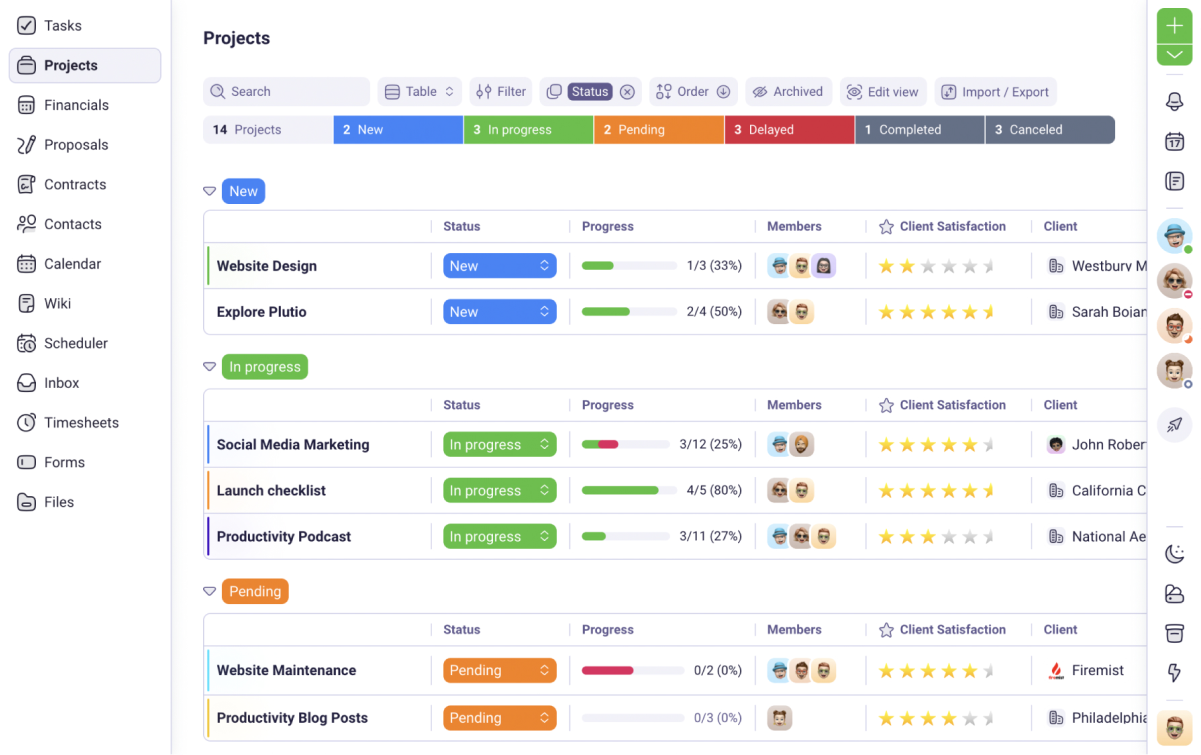
Source: Plutio
Plutio is another software built specifically for freelancers, and it provides several features that allow it to meet a variety of needs. This includes task boards, timesheets, and online payments. Plutio also allows users to customize their workflows by toggling certain features on or off.
Keep in mind that Plutio is a developing solution, so many online reviewers have had issues with certain features not working properly, and some features – such as automation – are missing altogether. The platform has a roadmap of new features to add, but it’s slow to implement them, which many former users found frustrating.
Also read: These Plutio Alternatives Can Help Run Your Business Better
Plutio’s popular features:
- Task management
- Time tracking
- Contracts
- Client management tool
- Proposals
Plutio’s pricing:
- Solo plan: $19 per month
- Studio plan: $39 per month for 10 contributors (+$5 per extra contributor/month)
- Agency plan: $99 per month for 30 contributors (+$5 per extra contributor/month)
8. nTask
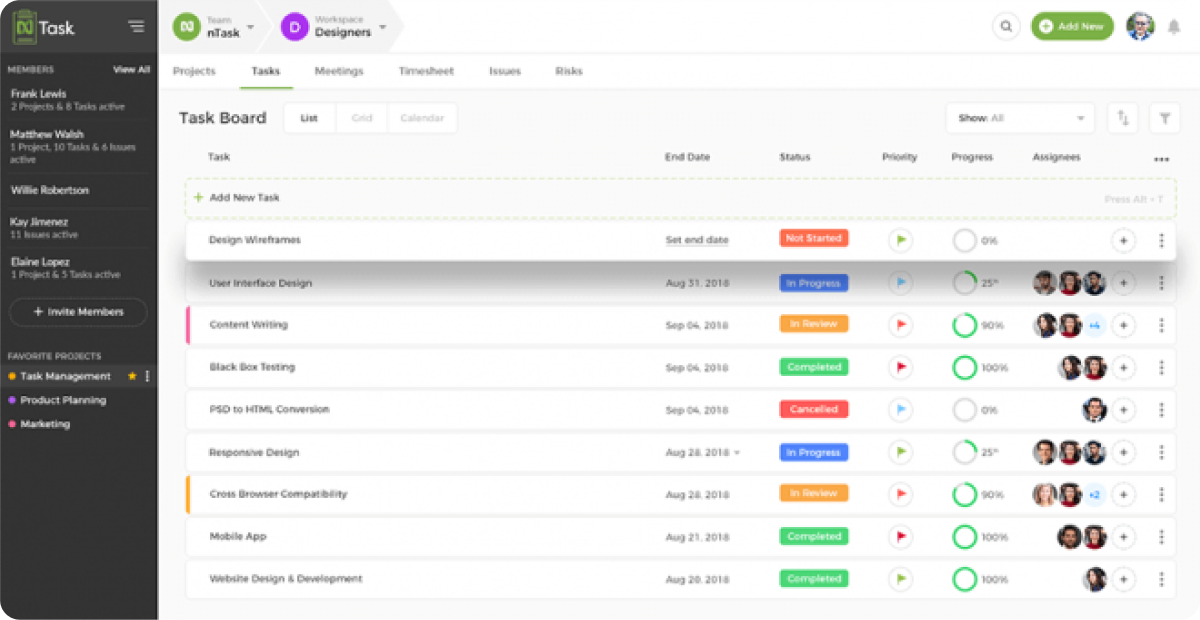
Source: nTask
HoneyBook doesn’t rely on integrations to deliver project management solutions, and neither does nTask. Unlike HoneyBook, however, nTask has robust project management features like Kanban boards, Gantt charts, and progress measurement within task tracking.
nTask is a good HoneyBook alternative for those looking for features like issue tracking and risk management in addition to a suite of usual project management functions. The app’s custom fields and workspace flexibility make it useful for freelancers and small teams.
Be warned that some online reviewers state that nTask doesn’t provide much technical support though.
Related: Best nTask Alternatives &Competitors [Paid & Free]
nTask’s popular features:
- Milestones
- Financial summaries
- Issue tracking
- Risk management
nTask’s pricing:
- Premium plan: $4 per user/month
- Business plan: $12 per user/month
- Enterprise plan: Contact for pricing
9. Paymo
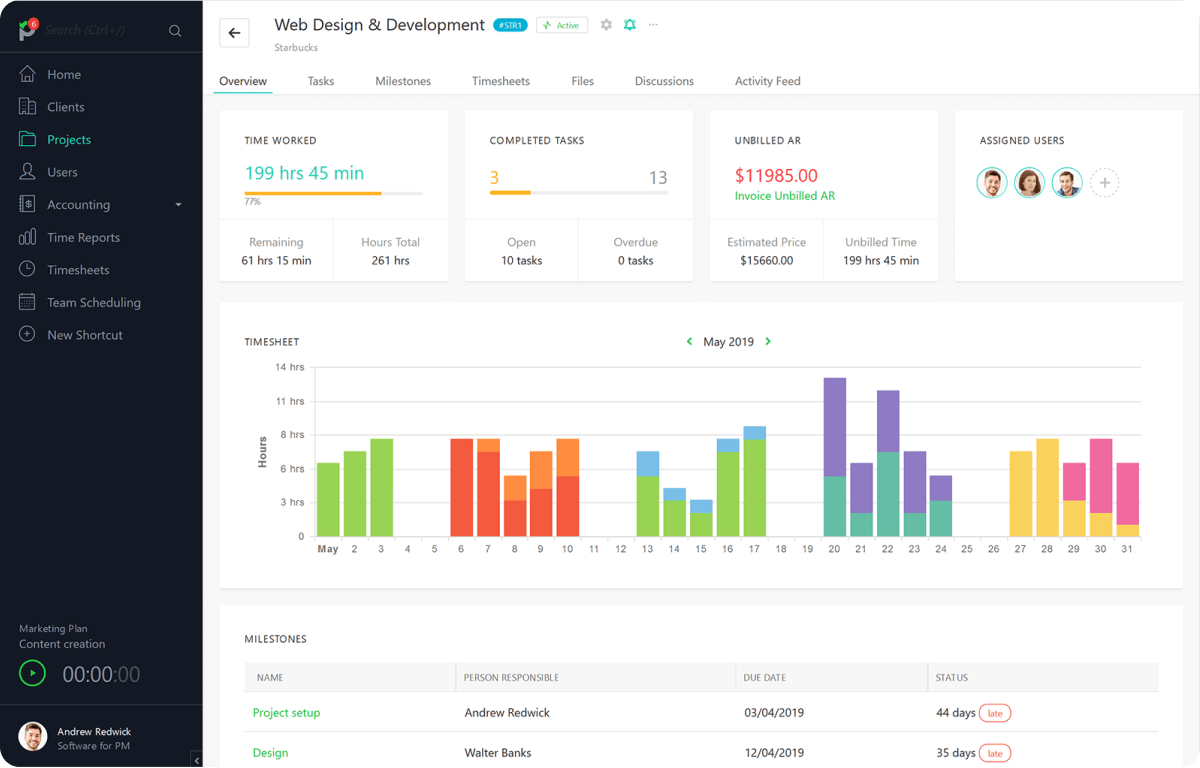
Source: Paymo
Paymo’s most significant selling point is that it’s an all-in-one project management, HR management, and customer relationship management tool. The platform also offers strong team scheduling and team collaboration abilities.
If you’re a freelancer or a project manager leading a small team, Paymo’s HR and sales features may be beyond your needs. For example, if you don’t have a complex sales process, it’s unlikely that you’ll need a tool with a visual sales pipeline. And with some reviewers complaining about the platform’s complex UI, you may want to opt for a simpler tool.
Also read: Paymo Alternatives: Top Competitors for Effective Project Management
Paymo’s popular features:
- Invoicing
- File storage
- Time tracking
- Expense tracking
- Process payments
Paymo’s pricing:
- Free plan
- Starter plan: $9.90 per user/month
- Small office plan: $15.90 per user/month
- Business plan: $23.90 per user/month
10. Monday.com
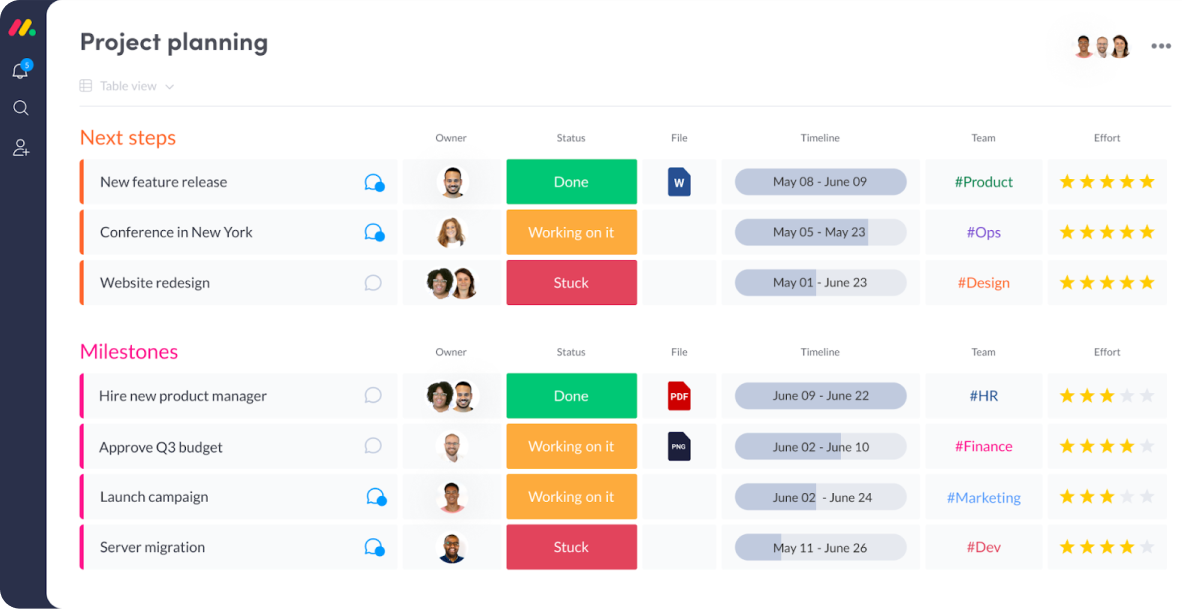
Source: Monday.com
Compared to HoneyBook, Monday is a more user-friendly project management tool. The platform boasts robust customization abilities, while also offering advanced workflow automation.
Monday allows users to easily view their project status in several different formats, and these features make it easy for remote teams to keep up to date on project progress.
The main downside to keep in mind is that creating workflows in Monday that meet your team’s needs may require a level of technical expertise that the platform’s onboarding tool can’t meet.
Related: Top Monday Alternatives That Are Worth Trying
Monday’s popular features:
- Kanban board view
- Task tracking
- Budget and expense tracking
- Custom reports
- Team collaboration
Monday’s pricing:
- Individual plan: Free
- Basic plan: $10 per user/month
- Standard plan: $12 per user/month
- Pro plan: $20 per user/month
- Enterprise plan: upon request
- Note: All paid plans require a minimum of 3 users
11. ProofHub
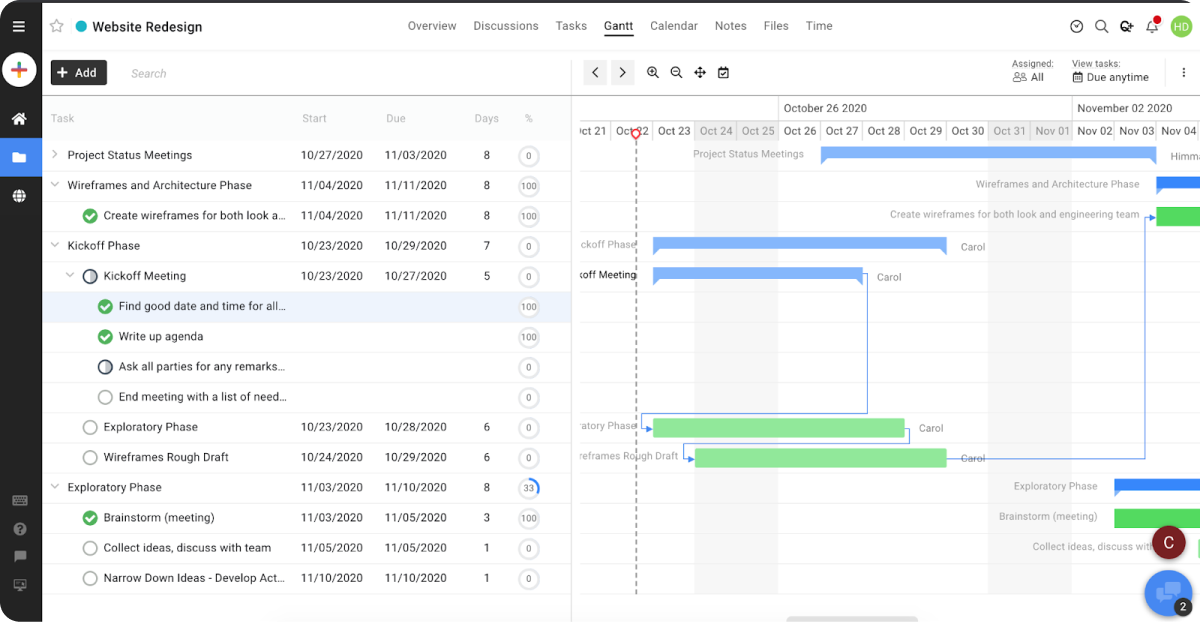
Source: ProofHub
ProofHub is an all-in-one project management platform that excels in visual collaboration, project templates, and reporting. The tool also has unique accessibility functions like feature bookmarks, keyboard shortcuts, and personal sticky notes that make it easy to use.
One of ProofHub’s downsides is that it can’t provide extensive reports on logged hours, which is a downside for small teams or freelancers looking for insights into their productivity or billable hours. Users also must rely on integrations to overcome obstacles caused by the platform’s missing invoicing, budget, and resource management features.
It’s also worth noting that ProofHub charges a flat rate per plan with an unlimited number of users, which means freelancers will find that the platform is significantly more expensive than other HoneyBook alternatives where they would only need one seat. That said, the pricing structure may work well for teams growing at a fast pace.
Related: Best ProofHub Alternatives to Consider [Free & Paid]
ProofHub’s popular features:
- Project templates
- Internal communication tool
- Milestones
- Online proofing
ProofHub’s pricing:
- Essential plan: $50 per month for 40 projects
- Ultimate control plan: $99 per month for unlimited projects
12. ClickUp
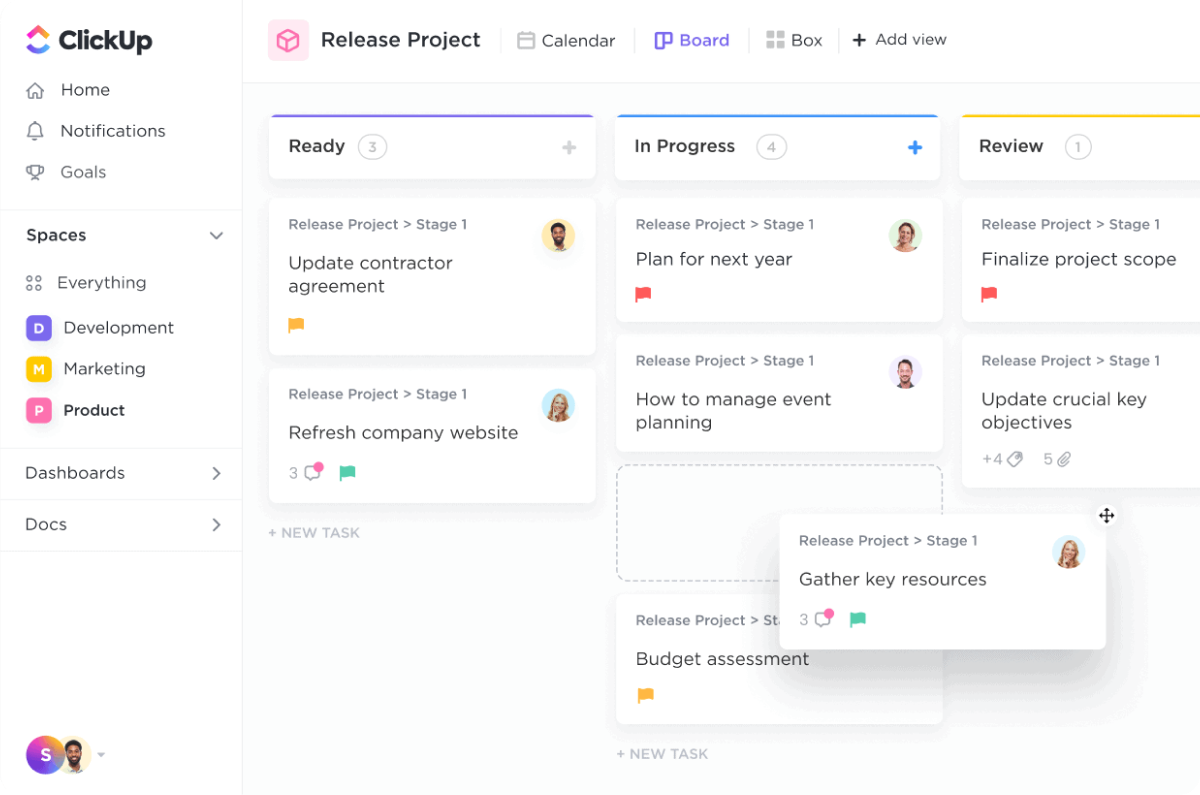
Source: ClickUp
ClickUp claims to be the “one app to replace them all” — in other words, an all-in-one solution that’s capable of doing quite a lot. This also means that the tool targets teams across industries doing any type of work.
To some extent, ClickUp’s claims are true. The tool can do a lot, including customizable tasks, templates, and numerous integrations. The main downside of this is the platform’s complexity. Having more capabilities than your team realistically needs can significantly delay the onboarding process.
Related: Top ClickUp Alternatives to Try [Free & Paid]
ClickUp’s popular features
- Tasks
- Whiteboards
- Dashboards
- Goals
ClickUp’s pricing
- Free plan
- Unlimited plan: $10 per user/month
- Business plan: $19 per user/month
- Enterprise plan: Contact sales
13. Toggl
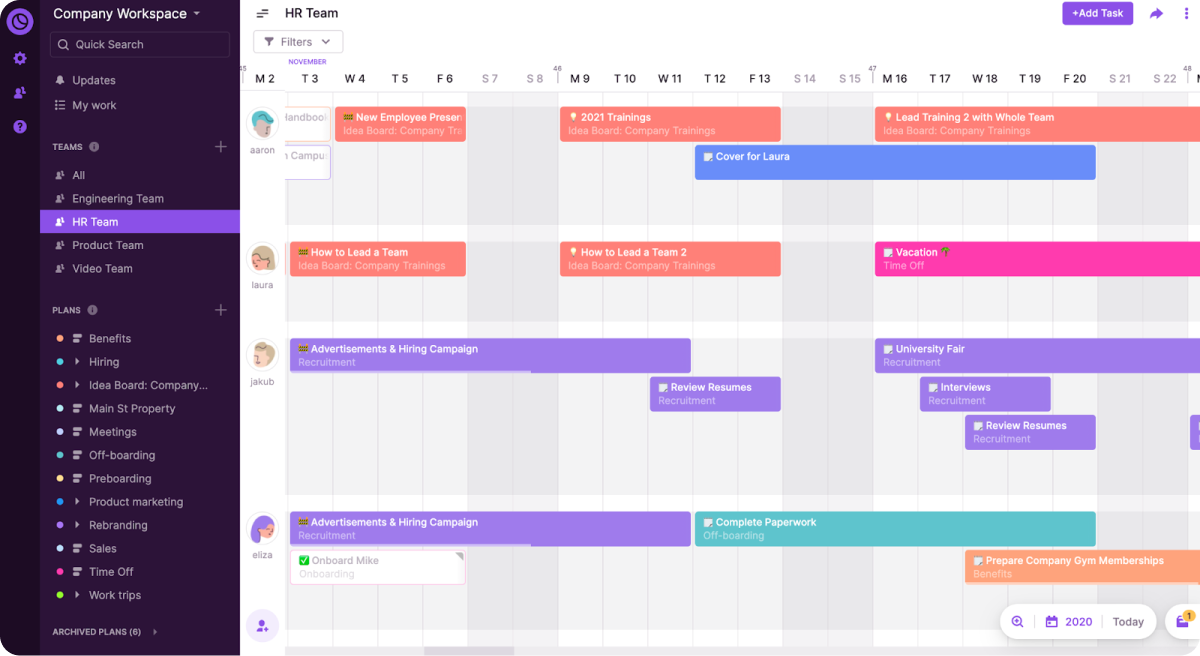
Source: Toggl Plan
Toggl offers a few products that might be useful as HoneyBook alternatives, but the catch is that you must pay for each product separately. Toggl Track and Toggl Plan are used for time tracking and project planning, respectively, and you’ll need to integrate the two to access both features.
The advantage of Toggl is that both its Track and Plan products have easy-to-use interfaces that are very straightforward. But in terms of its use as a HoneyBook alternative, all Toggl products lack the ability to invoice tracked hours, which can be a dealbreaker for many freelancers in search of a project management software solution that can do it all.
Also read: Toggl Alternatives: The Ultimate Comparison of Competing Time Trackers
Toggl’s popular features:
- Project planning
- Recurring tasks
- Resource planning
- Task management
Toggl’s pricing:
Toggl Track:
- Free: For up to 5 users
- Starter: $10 per user/month
- Premium: $20 per user/month
- Enterprise: Custom pricing
Toggl Plan:
- Team plan: $9 per user/month
- Business plan: $15 per user/month
14. Teamwork
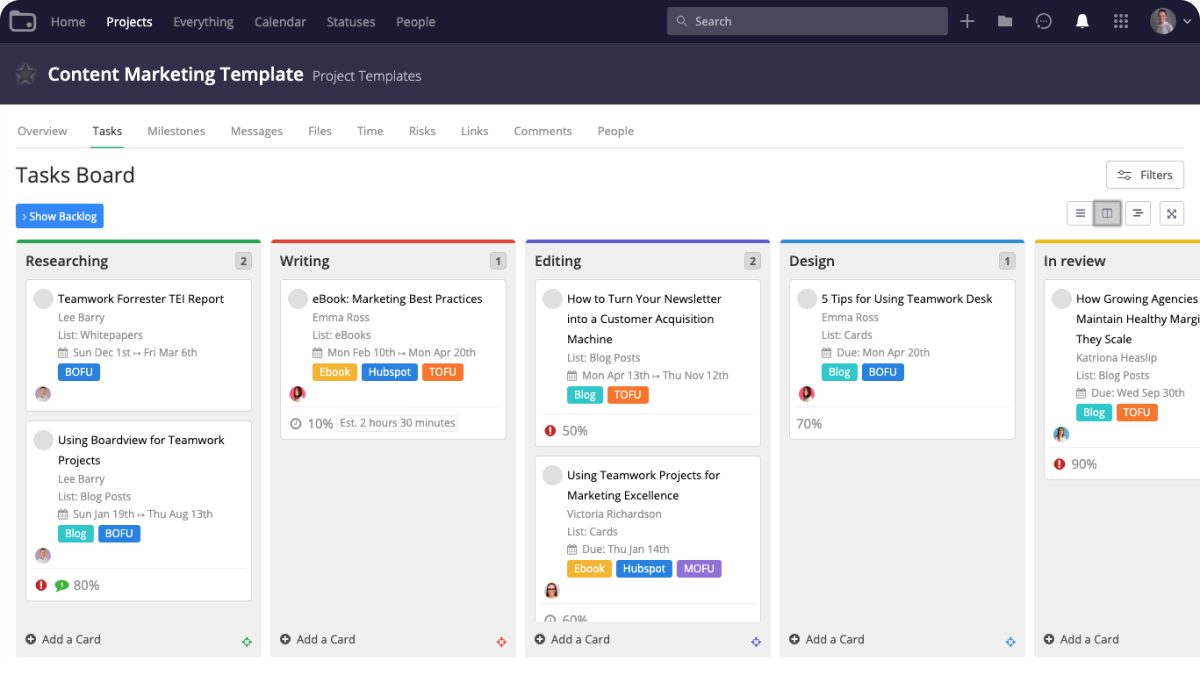
Source: Teamwork
Just like HoneyBook, Teamwork serves as a fairly comprehensive all-in-one project management tool. Users can track time, manage project profitability, and automate workflows using the software.
Freelancers might like Teamwork’s unlimited free client user feature, wherein clients can engage with the project by adding comments, tasks, and milestones to help ensure the client and project team are always on the same page. That said, Teamwork is unable to meet the needs of teams looking for comprehensive budget tracking and reporting tools.
Also read: An In-Depth Review of the Best Teamwork Alternatives
Teamwork’s popular features:
- Time tracking
- Interactive Gantt charts
- Workload management
- Task dependencies
Teamwork’s pricing:
- Free forever plan: $0 for up to 5 users
- Starter plan: $8.99 per user/month (3 user minimum)
- Deliver plan: $13.99 per user/month (3 user minimum)
- Grow plan: $25.99 per user/month (5 user minimum)
- Scale plan: Pricing upon request
15. Basecamp
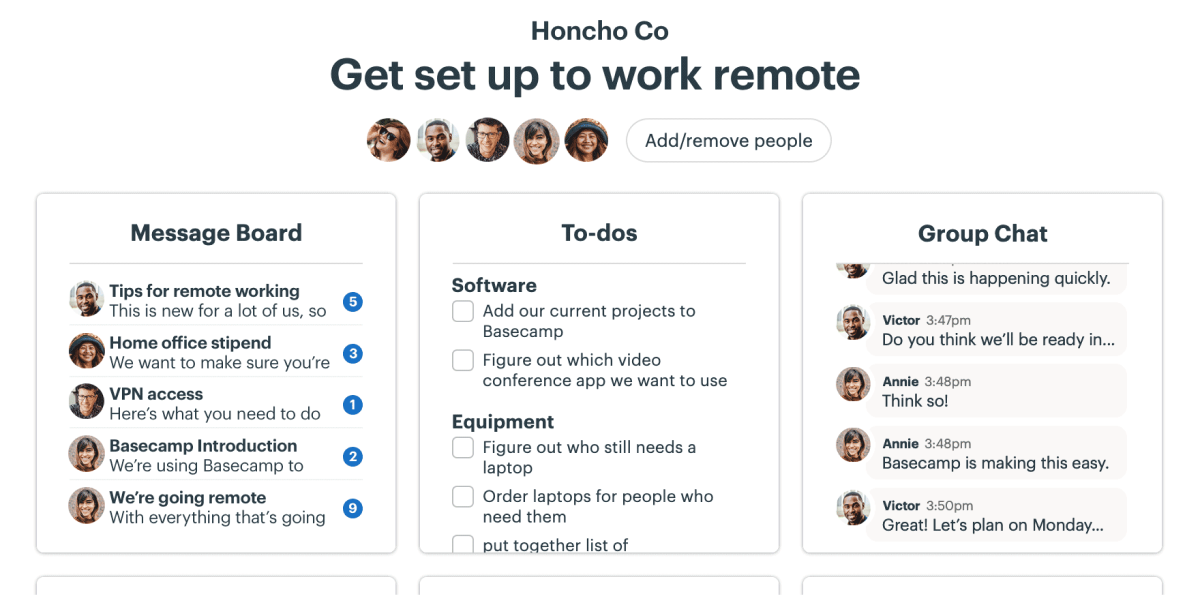
Source: Basecamp
Those working in remote teams will find Basecamp’s focus on collaboration to be a benefit that allows teams to stay connected more easily. Basecamp has a messenger feature that can help to declutter email inboxes, a group chat feature, and discussion threads.
The tool’s greatest downfall compared to HoneyBook is its lack of native time tracking and a dashboard that’s optimized for just one project at a time.
Related: Basecamp Alternatives: A Deep Dive Into The Top Competitors
Basecamp’s popular features:
- Message boards
- Prioritize tasks
- Automatic check-ins
- Client portal
- Document sharing
Basecamp’s pricing:
- Individual plan: $15 per user/month
- Pro Unlimited plan: $349 per month for unlimited users
16. Airtable
![]()
Source: Airtable
Airtable isn’t a good fit for all project teams, but those who work with a large amount of data might find it useful. The Airtable interface is a cross between a database and a spreadsheet which can make organizing information easier.
The tool’s customizability means it can be used by workers in a range of industries, including freelancers. For example, freelancers can build a system for contact management and organizing project tasks within Airtable. Expect to potentially need a bit of technical expertise in order to build workflows though.
Also read: Redefine Productivity With These Airtable Competitors
Airtable’s popular features:
- Relational databases
- Assign tasks
- Multiple project views
- Customizable automations
Airtable’s pricing:
- Free plan
- Team plan: $24 per user/month
- Business plan: $54 per user/month
- Enterprise scale plan: Contact sales
Takeaway
Well, that concludes our list of the best HoneyBook alternatives to try in 2024.
As you can see, you have many options, the question is which features you care about most. Keep in mind that an all-in-one platform such as Rodeo Drive is likely going to bring you the best features at the best price without forcing you to rely on third-party integrations.
Come see for yourself why Rodeo Drive is the best HoneyBook alternative – get started for free today.





